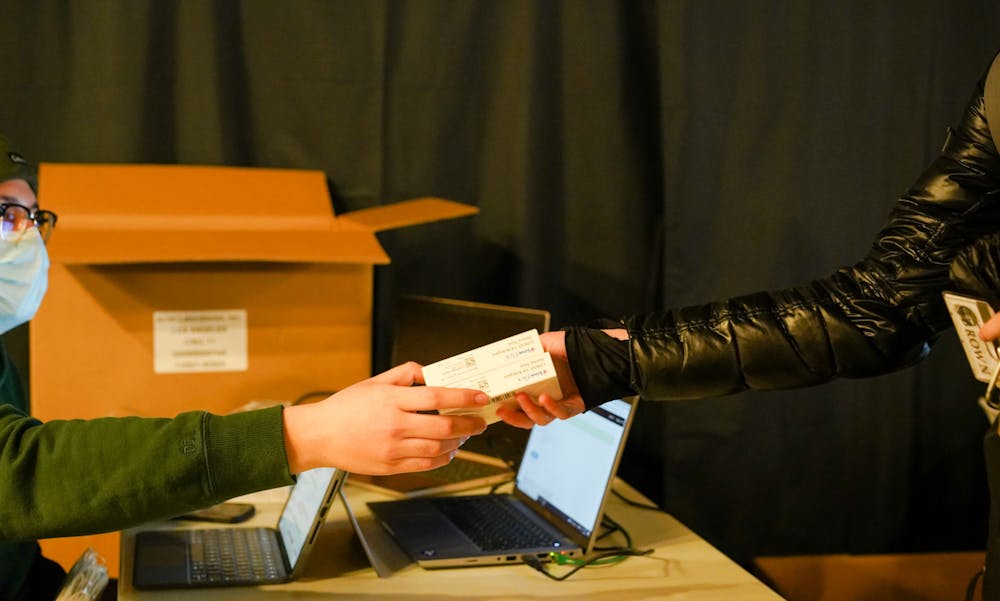As the COVID-19 pandemic nears its two-year anniversary, testing and quarantine protocols continue to change. This semester’s change in testing protocol has led to a reduction of staff working in the testing center from 125 at the start of the fall 2021 semester to just 10 this spring, according to Testing Site Lead Allison Spain.
Prior to the start of the second semester, a Jan. 12 email to the University community announced that optional PCR testing would be replaced by twice-weekly rapid antigen testing — another adjustment to a testing program that has seen a number of iterations since its inception in fall 2020.
Under current testing protocols, community members swipe their Brown ID card at Alumnae Hall or One Davol Square and pick up their two weekly tests to complete elsewhere, along with a pack of 10 KN95 masks.
The current testing center operations, Spain said, are much different than what students and employees were familiar with throughout late 2020 and the majority of 2021, with changes to PPE requirements, staffing levels and shift lengths.
At the outset of the pandemic, the main testing sites were located at the Olney-Margolies Athletic Center and One Davol Square in the Jewelry District. Testing has since moved from the OMAC to Alumnae Hall on Pembroke Campus, while the One Davol Square site has remained open.
The process to take a COVID-19 test once took multiple steps: students scheduled an appointment, gave their Brown ID to an employee, found an available station with a worker clad in PPE, swabbed their nose and dropped off a tube with identifying information to receive results later.
Now, students can enter the testing center anytime within its hours of operation and are greeted by a comparably small staff that wears no PPE other than masks.
“(They) were in KN95s, face shields, gowns (and) gloves,” Spain said. “That’s all been taken away — now it’s just masking.”
The process of winding down the testing site operations was “relatively smooth,” according to Spain. The employees are subcontractors of Advanced Clinical, the company that oversees the University’s testing operations.
“We did make a point to communicate to our staffers that this (job) is project-based, so we don’t have a ton of insight as to the longevity of the contract,” she said.
Employees who wanted to continue working at the University testing sites were given a chance to reapply and were chosen based on “performance ability,” according to Spain.
With the reduction in employees, remaining staff have to work full shifts, Spain said, which are nine hours at One Davol Square and from seven to ten and a half hours at Alumnae Hall.
Advanced Clinical also has a “backup pool” of people who can step in if employees themselves get sick, Spain said, though she described it as “a last minute arrangement.”
When Sophie Buccheit ’23 worked at the testing site between July and December 2021, she said she often “maxed out” on the number of hours she worked, reaching 30 per week.
“I was working full days Saturday and Sunday along with Monday afternoons and a couple other sporadic shifts,” she said.
Balancing working at the testing site and doing school was “a little bit much,” she added. While the job was demanding, Buccheit enjoyed seeing students everyday — it was something she was “happy to do” to get University life “back to normal.”
Buccheit did have one complaint: There was “not a whole lot of communication” from both the University and Advanced Clinical.
“We have worked with Verily and Advanced Clinical to adjust testing-site operations dozens of times throughout the pandemic based on public health conditions, testing frequency requirements and other factors,” University Spokesperson Brian Clark wrote in an email to The Herald.
“Advanced Clinical is an external service provider that works with a variety of clients and they work directly with their employees to deploy staff as needed,” Clark continued.
Advanced Clinical referred The Herald to Spain for comment and did not respond to multiple requests for comment about their communication processes.
Employees that are no longer working for Advanced Clinical were “disappointed” at the end of their contract, but many moved on to full-time work or other opportunities such as graduate school, Spain said.
Bucchiet said she is now working on Brown EMS-affiliated projects such as cold and flu testing along with tutoring.
Spain said she wrote recommendation letters for previous employees who needed them and has looked for new work opportunities for former employees.
“I’ve written several recommendation letters and everyone has my cell phone (number) if they need anything,” Spain said. “I’m always willing to help. I want to see everyone succeed.”





